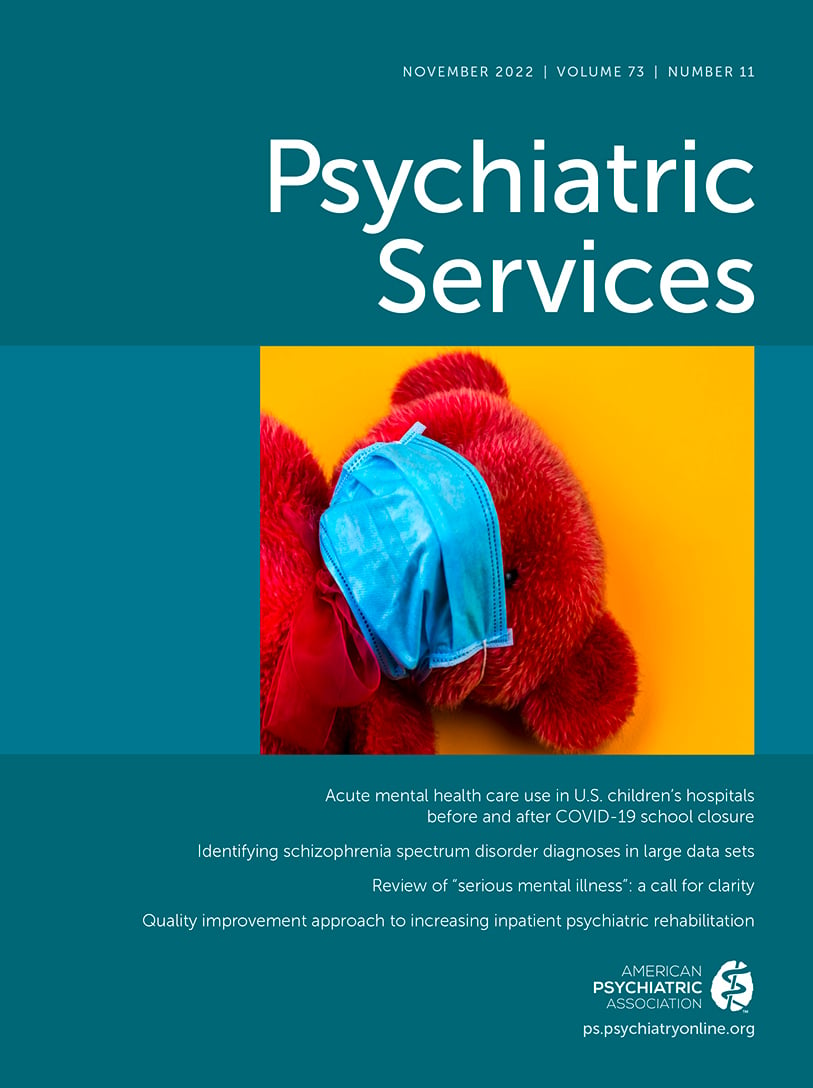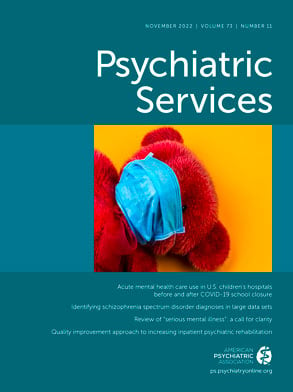TO THE EDITOR: Hispanic suicide rates rose 21.8% in the United States from 2015 to 2020 (
1), coinciding with increased anti-immigrant sentiment and discrimination toward Hispanic persons (
2). Since 2015, Hispanics have become more pessimistic about their place in the United States (
3). Nearly four in 10 U.S. Hispanics reported experiencing discrimination in 2019 alone (
3). Suicidal ideation and the effects of traumatic social interaction such as discrimination are commonly presented clinically through routine mental health assessment and counseling visits. We examined whether being the target of discrimination was associated with suicidal ideation from 2010 to 2020 among Hispanic mental health care patients.
We used deidentified data from Holmusk, captured with the MindLinc electronic health record system through routine clinical care in 23 behavioral health systems located across 13 states (Arizona, Colorado, Connecticut, Georgia, Illinois, Indiana, Missouri, New York, North Carolina, Pennsylvania, South Dakota, Virginia, and Wisconsin). Clinicians often document suicidal ideation by using free-text notes rather than standardized diagnostic codes (
4). This approach lacks standardization and challenges the identification of patients experiencing suicidal thoughts. To overcome this limitation, Holmusk uses deep-learning natural language processing (NLP) algorithms to quantify free-text patient assessment information and information about social circumstances.
Conducting complete case analysis, we examined 52,703 patient-year observations from 2010 to 2020 (representing 22,968 unique Hispanic patients). Our dependent variable indicated whether a patient experienced suicidal ideation within a year. Our explanatory variable indicated whether a patient reported being the target of discrimination within a year. Using Holmusk’s NLP algorithms, we constructed variables with clinical assessment notes from mental health practitioners.
We conducted a pooled cross-sectional analysis and estimated multivariable logistic regression models to examine the relationship between experiencing discrimination and suicidal ideation during a calendar year. The institutional review board at the University of Utah deemed this study non-human-subjects research.
We found that 19.0% of Hispanic patients per year who experienced discrimination also experienced suicidal ideation during the study, compared to 11.5% of Hispanic patients per year who did not experience discrimination (p=0.001). After adjusting for year, age, gender, and years of education, we estimated that Hispanic patients who were the target of discrimination had 1.72 greater odds of having suicidal thoughts in a given year than Hispanic patients who did not experience discrimination (p=0.003). In an age-stratified analysis, we estimated that Hispanic patients ages <35 who experienced discrimination had 1.93 greater odds of having suicidal thoughts in a given year compared to Hispanic patients ages <35 who did not experience discrimination, after adjustment for confounders (p=0.002).
Experiencing discrimination may be associated with a higher suicidal ideation risk among Hispanic mental health patients in a given year, particularly patients younger than 35. Our findings appear consistent with survey data linking higher self-reported rates of discrimination and suicidality (
5), which is concerning, given recent reports of increased discrimination toward Hispanic populations (
3). Although Hispanic suicide risk remains understudied, NLP may be a promising method for categorizing free-text information about discrimination and other adverse social circumstances affecting many Hispanic patients. Characterizing social risk factors for suicidality may help mental health practitioners understand how patterns of discrimination or other social disadvantages affect Hispanic patients’ risk for self-harm.

